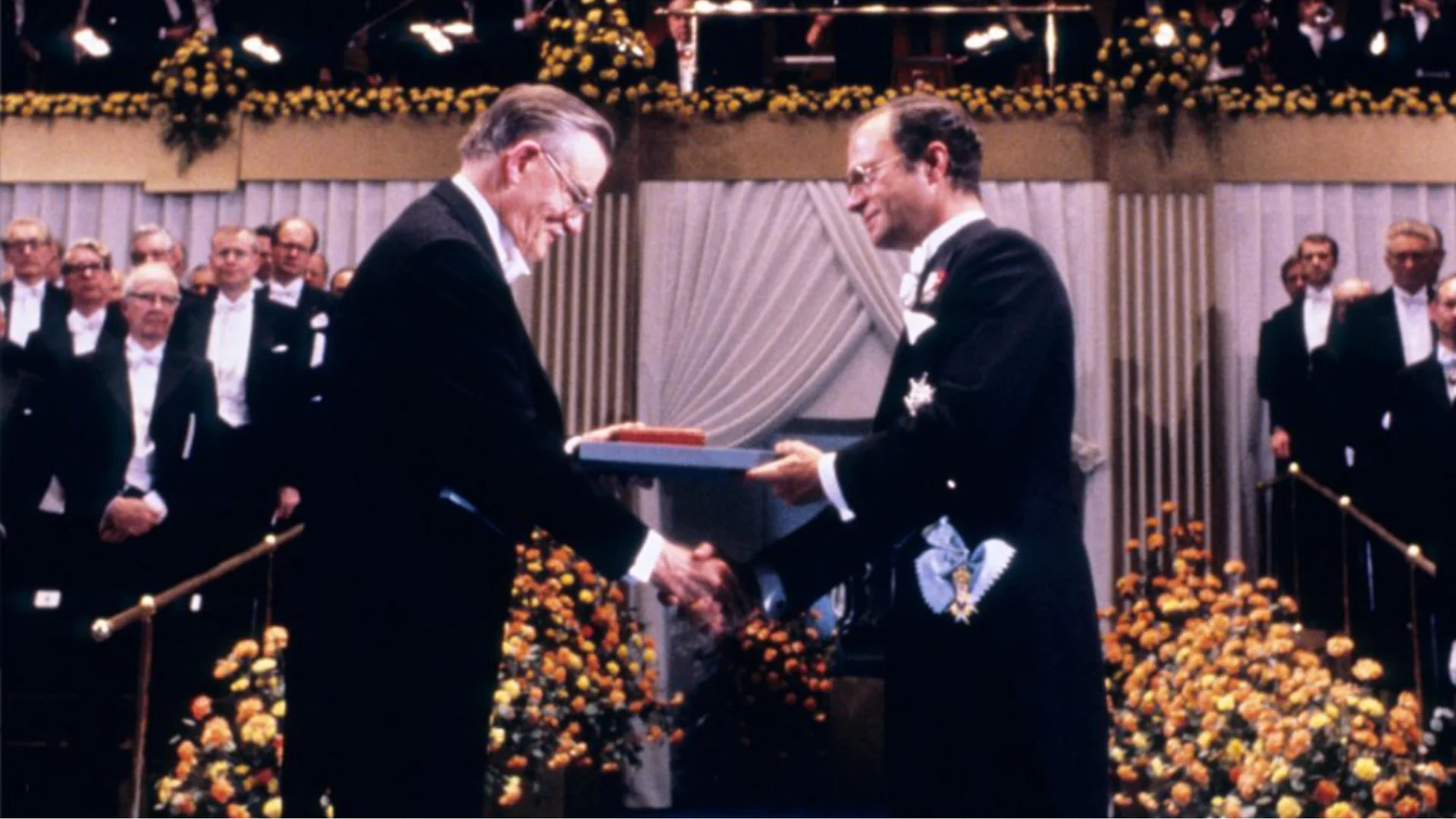Honorary President of the Walter Eucken Institute (1919–2013) James M. Buchanan
The co-founder of the Public Choice Theory and important contributor to Constitutional Economics was born in 1919 in Tennessee. This is where he also studied and received his M.A. in economics in 1941.
To the book "Spielregeln für eine bessere Politik"
After his military service he enrolled as a Ph.D. student at the University of Chicago in 1946. Mainly due to the influence of Frank Knight, Buchanan became a persuaded supporter of the free market economy. After his graduation in 1948 he devoted himself to Knut Wicksell’s work on public finance “Finanztheoretische Untersuchungen”, a book little was known about in the USA back then.
By studying Wicksell’s work Buchanan got his two crucial ideas for his further research program: Firstly, the fault of a benevolent dictator as the addressor for economical/political advices. Secondly, the relevance of the common interest (mutual consensus) as a measurement for efficiency and fairness of public activities. Buchanan developed these two ideas to what is known today as Public Choice and Constitutional Economics.
Buchanan’s academic career started with professorships at the University of Tennessee (1948-1951) and at the Florida State University (1951-1956). Except for short lectures (e.g. at the University of California or at the London School of Economics) Buchanan had held several full professorships at public universities in Virginia. Since 1983 he does his research at the George Mason University in Fairfax. In 1986 he received the Nobel Memorial Prize in Economic Sciences. Currently, he received the Walter Eucken Medal 2009.
Buchanans Work

Buchanan owes the Nobel Prize to his works (at least partially) leading to the creation of the Theory of Public Choice – especially in the sense of the “Virginia School of Political Economy”. Buchanan is a resolute opponent of the established welfare economics. This branch of economics compares real economic conditions with the help of theoretical fictions like perfect competition. If there is a mismatch the theory suggests the existence of market failures and calls for political interventions. At the same time politicians are seen as benevolent and almighty instead of rational self-interested individuals. Buchanan solve this inconsistency by modeling political actors which are – like the „homo oeconomicus“ – first of all interested in their own advantage. Therefore it is essential to analyze the institutional restrictions to the freedom of political action as well as the political incentive schemes. Thereby Buchanan observes that the functional structures of a “invisible hand”, which combines individual and common interest with the help of voluntary exchange under competition, are much more inappropriate in the framework of the political area compared to the market area.
With the help of this conclusion Buchanan finds elementary characteristics of collective actions which frame the basics of the Public Choice Theory today. For instance the difficulties connected with the formation of rational and well-informed voters’ preferences as well as expressing and satisfying them collectively. This in turn helps to explain the abuse of political power in order to obtain privileges. Buchanan (together with Gordon Tullock) also demonstrates that the waste of public resources already originates in the competition for those political rents („rent-seeking“). From the analysis of the political incentives Buchanan (with Richard Wagner, Geoffrey Brennan and others) likewise deducts explanations and destructive criticism of Keynesian deficit spending, oversized public budgets and inefficient tax schemes. More radical than other representatives of the economic theory of democracy (e.g. the “spatial voting” models following Downs) Buchanan’s „Virginia Political Economy“ deletes the manifold reasons for political failure. At the same time his interest lies beyond mainstream Public Choice, namely in the explanation and enlightenment of politics. Failures in the political area are not due to rational, self-interested motives but due to inefficient restrictions of political actions. Therefore the political constitution presents the key issue.
A revised version is published in:
Gisela Riescher (ed.), Politische Theorie der Gegenwart in Einzeldarstellungen von Adorno bis Young, Stuttgart: Kröner, 2004, 72-75.
Buchanan, James M., The Collected Works of J. M. Buchanan, 20 Volumes, Indianapolis 1999 – 2002.
Buchanan, James M., Die Grenzen der Freiheit. Zwischen Anarchie und Leviathan, Tübingen 1984.
Buchanan, James M., Markt, Freiheit und Demokratie, St. Augustin 1992.
Buchanan, James M. / G. Brennan, Die Begründung von Regeln, Tübingen 1993.
Vanberg, Viktor J.: Rules and Choice in Economics, London 1994.
Pies, Ingo / Martin Leschke (Hrsg.): J. M. Buchanans konstitutionelle Ökonomik, Tübingen 1996.
Petersen, Thomas: Individuelle Freiheit und allgemeiner Wille. Buchanans politische Ökonomie und die politische Philosophie, Tübingen 1996.
Mueller, Dennis C.: Constitutional Democracy, Oxford 1996.
Brennan, Geoffrey / Hartmut Kliemt / Robert D. Tollison (Hrsg.): Method and Morals in Constitutional Economics. Essays in Honor of J. M. Buchanan, Berlin 2002.